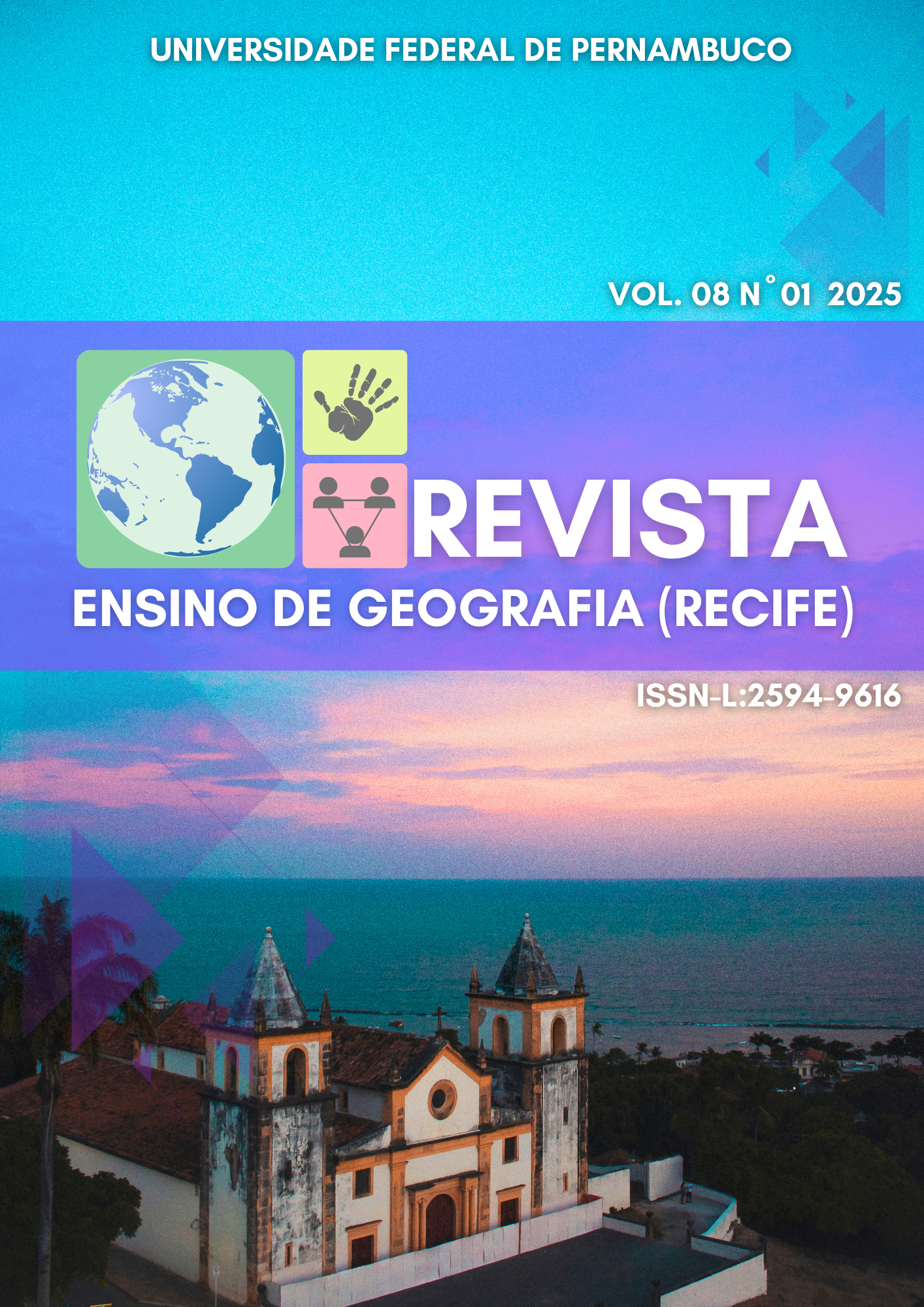Recycling: a sustainable solution to preserve the environment
DOI:
https://doi.org/10.51359/2594-9616.2025.265512Keywords:
recycling, environmental education, waste managementAbstract
The incorrect disposal of solid waste has caused environmental impacts by contaminating the environment. The management of this waste is an effective alternative to reduce this waste. In this sense, recycling has proven to be an effective tool for environmental preservation. Through recycling, it is possible to reuse discarded materials and transform them into new materials. Thus, projects that encourage this action promote environmental awareness, reducing impacts on the environment. Thus, the present work aims to promote a comprehensive awareness about the relevance of recycling for environmental preservation through educational activities. As a methodology, a bibliographical survey on the subject was carried out, and an extension project linked to the State University of Paraná – Paranavaí Campus was carried out with higher education and basic education students, where topics such as selective collection, types of waste, decomposition time and soil contamination, among other related aspects, were worked on. During the implementation of the extension project, posters were made and a participatory dynamic was carried out to reinforce the theoretical content presented. In the final stage of the project, fieldwork was carried out in a recycling cooperative called Coopervaí, located in the city of Paranavaí-PR, allowing the integration of theory and practice. This activity provided an understanding of the recycling process and its importance for environmental preservation.
References
AGÊNCIA BRASIL. Índice de reciclagem no Brasil é de 4%, diz Abrelpe. 2022. Disponível em: https://agenciabrasil.ebc.com.br/geral/noticia/2022-06/indice-de-reciclagem-no-brasil-e-de-4-diz-abrelpe. Acesso em: 15 set.. 2024.
ALGERI, CARLA. Instituto Federal Santa Catarina. Reciclagem e reutilização: é possível transformar o lixo em lucro?, 2022. Disponível em: https://www.ifsc.edu.br/post-ifsc-verifica/-/asset_publisher/uII70Nv266Xk/content/id/13735672/reciclagem-e-reutiliza%C3%A7%C3%A3o-%C3%A9-poss%C3%ADvel-transformar-o-lixo-em-lucro. Acesso em 13 out. 2024
BRASIL. Lei n. 12.305, de 2 de agosto de 2010. Institui a Política Nacional de Resíduos Sólidos; altera a Lei n. 9.605, de 12 de fevereiro de 1998; e dá outras providências. Diário Oficial da União: seção 1, Brasília, DF, 3 ago. 2010. Disponível em: http://www.planalto.gov.br/ccivil_03/_ato2007-2010/2010/lei/l12305.htm. Acesso em: 13 out. 2024.
BRASIL. Lei n. 12.305, de 2 de agosto de 2010. Institui a Política Nacional de Resíduos Sólidos; altera a Lei n. 9.605, de 12 de fevereiro de 1998; e dá outras providências. Diário Oficial da União: seção 1, Brasília, DF, 3 ago. 2010. Disponível em: http://www.planalto.gov.br/ccivil_03/_ato2007-2010/2010/lei/l12305.htm. Acesso em: 13 out. 2024.
BRASIL. Decreto nº 11.043, de 13 de abril de 2022. Aprova o Plano Nacional de Resíduos Sólidos. Brasília, DF, 2002. Disponível em: https://planalto.gov.br/ccivil_03/_Ato2019-2022/2022/Decreto/D11043.htm. Acesso em: 14 de setembro de 2024.
BRASIL. Decreto nº 11.044, de 13 de abril de 2022. Institui o Certificado de Crédito de Reciclagem - Recicla+. Brasília, DF, 2002. Disponível em: https://legislacao.presidencia.gov.br/atos/?tipo=DEC&numero=11044&ano=2022&ato=06ek3aU1kMZpWT5a3.Acesso em: 14 de setembro de 2024.
EPA. Agência de Proteção Ambiental dos Estados Unidos. Site traz informações do termo reciclar. Disponível em: https://www.epa.gov/. Acesso em 10 set. 2024.
GOVERNO DO PARANÁ. Governo anuncia programa de coleta seletiva em Paranavaí, 2003. Disponível em: https://arquivo2003.aen.pr.gov.br/Noticia/Governo-anuncia-programa-de-coleta-seletiva-em-Paranavai. Acesso em: 13 out. 2024.
LEON, M. P. P. Reciclagem sustentável e suas contribuições para um mundo
melhor. 2015. Disponível em: https://www.webartigos.com/artigos/reciclagem.
Acessado em: 08 set. 2024
MELLO, S. V.. Humanidade produz mais de 8 bilhões de toneladas de lixo por ano diz ONU em dia mundial, 2018. Disponível em: https://brasil.un.org/pt-br/81186-humanidade-produz-mais-de-2-bilh%C3%B5es-de-toneladas-de-lixo-por-ano-diz-onu-em-dia-mundial. Acesso em 14 de setembro de 2024.
ONU. Organização das Nações Unidas: a humanidade produz mais de 2 bilhões de toneladas de lixo
por ano, diz ONU em Dia Mundial, 2019. Disponível em: https://brasil.un.org/pt-br/81186-humanidade-produz-mais-de-2-bilh%C3%B5es-de-toneladas-de-lixo-por-ano-diz-onu-em-dia-mundial. Acesso em: 13 set. 2024.
PORTAL SUSTENTABILIDADE. A história da Reciclagem no Brasil e no Mundo. Disponível em: https://portalsustentabilidade.com/2022/05/19/a-historia-da-reciclagem-no-brasil-e-no-mundo/. Acesso em: 13 set. 2024.
SANTOS, Milton. A Natureza do Espaço: Técnica e Tempo. Razão e Emoção. 4. ed. São Paulo: Editora da Universidade de São Paulo, 2006.
WWF-BRASIL. Conheça os benefícios da coleta seletiva. Disponível em: https://www.wwf.org.br/?14001/. Acesso em 13 out. 2024.
Downloads
Published
How to Cite
Issue
Section
License
Copyright (c) 2025 Ariana Castilhos dos Santos Toss Sampaio

This work is licensed under a Creative Commons Attribution 4.0 International License.
Authors who publish with this journal agree to the following terms:- Authors retain copyright and grant the REVISTA ENSINO DE GEOGRAFIA (RECIFE) right of first publication with the work simultaneously licensed under a Creative Commons Attribution NonCommercial International 4.0 (CC BY-NC) that allows others to share the work with an acknowledgement of the work's authorship and initial publication in this journal.
- Authors are able to enter into separate, additional contractual arrangements for the non-exclusive distribution of the journal's published version of the work (e.g., post it to an institutional repository or publish it in a book), with an acknowledgement of its initial publication in this journal.
- Authors are permitted and encouraged to post their work online (e.g., in institutional repositories or on their website) prior to and during the submission process, as it can lead to productive exchanges, as well as earlier and greater citation of published work.



